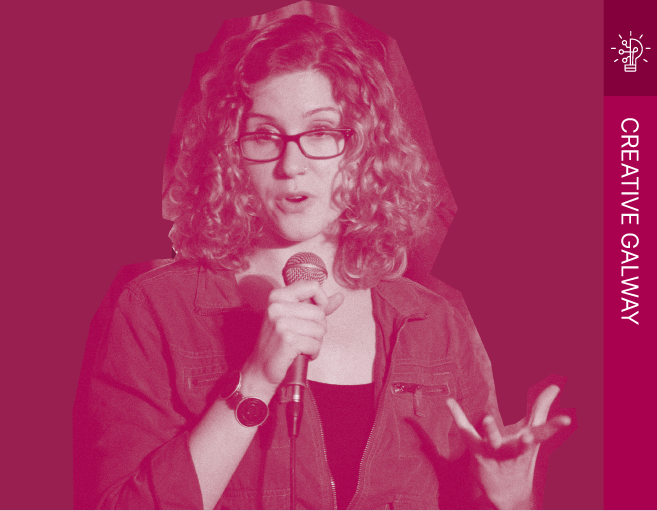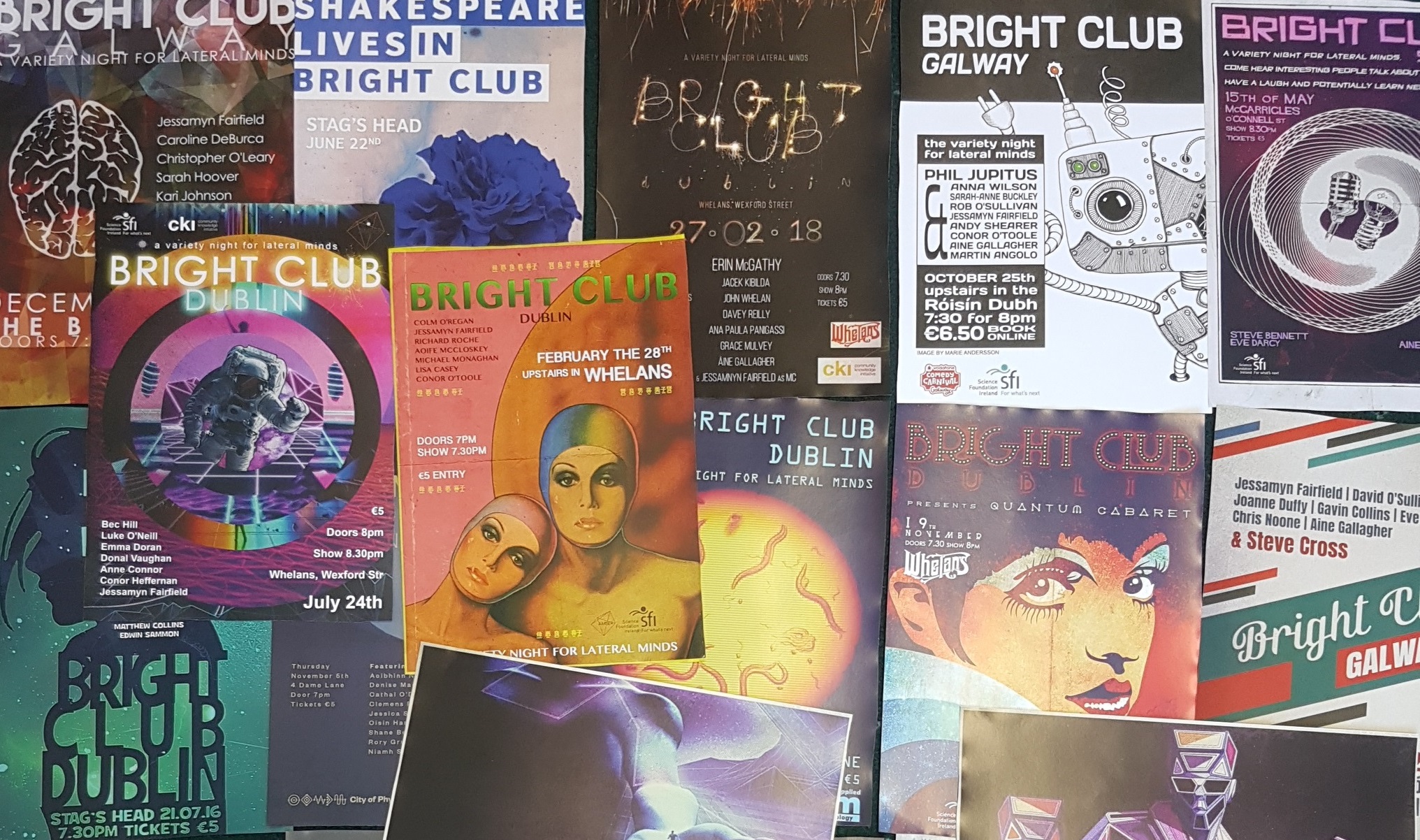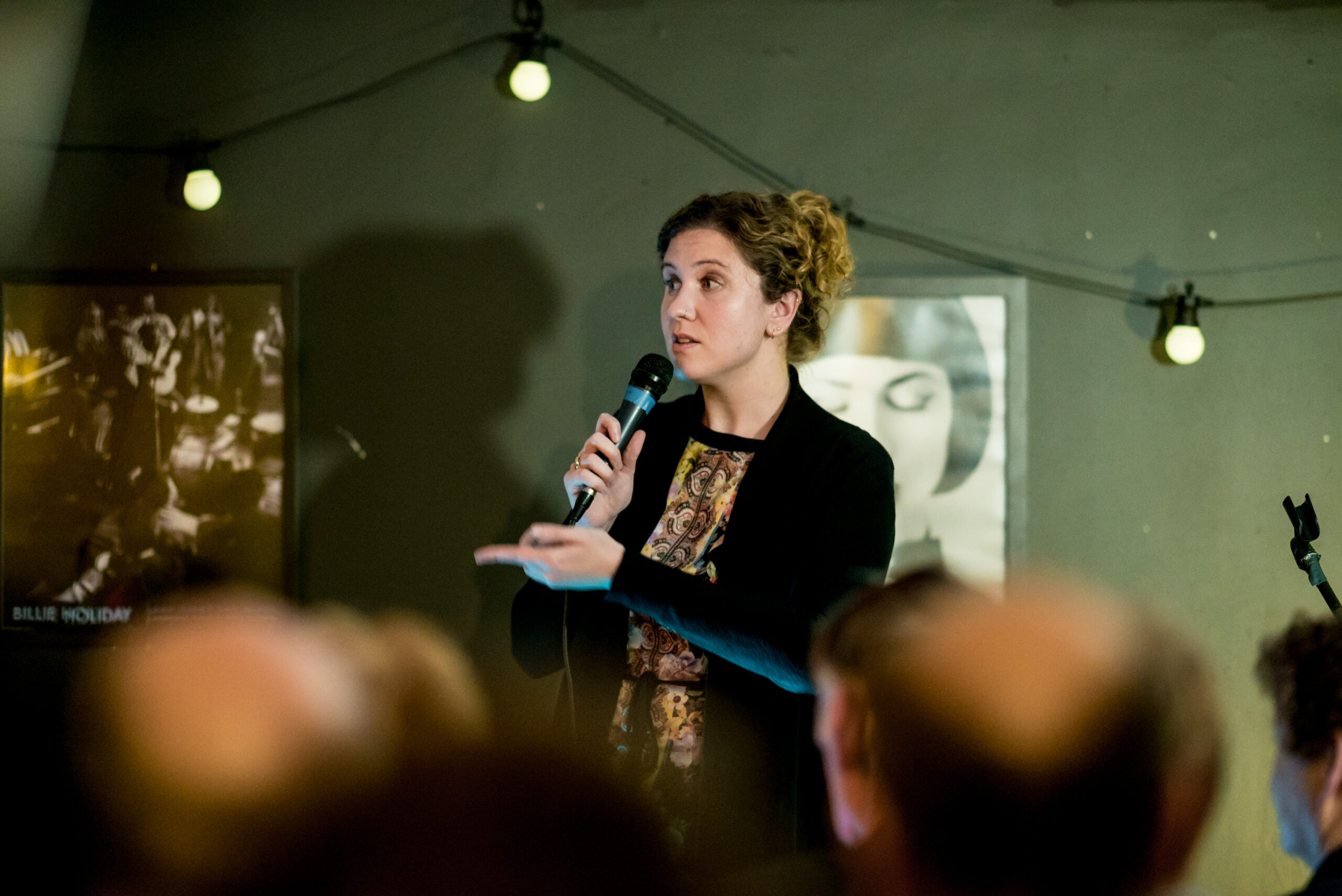
I walked into the room to the sounds of laughter being stifled. The head of school ushered me into his office, past a distinct lack of eye contact from our department administrator.
“We’re delighted that you’ve signed your contract and are looking forward to having you here in September,” he said as I sat down. I was delighted myself, to have finally landed an academic position in a physics department after a lengthy job search and a series of very short, borderline exploitative contracts.
“I’m looking forward to it,” I said. Curiosity won out over professionalism and I tilted my head at the door to the other room. “Can I ask what that was about?”
“Ah,” he paused, “yes well, we circulated your Galway Fringe poster to the School.” I was performing my first solo comedy show in Galway, after a moderately successful run in Dublin. It was about science, feminism and feelings, and the poster had the title emblazoned across the top: “F*** This! and other stories”.
“That’s very kind of you,” I said, wondering how my material on getting divorced might go down with my new colleagues, if any of them attended.
“I think our administrator was a little shocked,” he said, “and when I came in she told me, ‘You’ve hired a bloody comedian!’”
We both laughed, though I felt a twinge of discomfort. It was public knowledge, my comedy and improv shows, and I’d even recently launched a public engagement project called Bright Club where I worked with academics to develop and perform stand-up comedy about their research. We have now had over 100 shows across Ireland, featured in festivals such as Body and Soul and Dublin Fringe, and trained hundreds of academics, but at the time, it was still a very new project that sometimes felt hard to explain to people.

Which, I suppose, is how I felt about my creative life – it was often hard to explain to other scientists. This never made any sense to me, as scientific research is fundamentally creative: you are searching for something unknown, that no one else has ever figured out before, and you often have to think outside of existing preconceptions. Basic tenets of improvisation like being open to surprise, lateral thinking and asking, “if this is true, what else is true?” are incredibly powerful when applied to research. And the best research meetings are like the best comedy shows – freewheeling festivals of ideas where everyone present is supporting each other to find something new and amazing.
Yet, for some reason, I had also seen evidence of a culture of criticism in academic science. It showed itself at conferences, when the questions after a talk were mostly comments, or nit-picking intended to make the questioner seem smarter than the speaker. And it could show itself in individual research groups, creating a competitive fear-based environment rather than something collaborative and constructive, which would have led to better science.
I started Bright Club because I saw a lot of the same things happening in public perceptions of science: the idea that science was a nit-picky, remote, by-the-book affair hid so much of the creativity and excitement of the process. And, I worried that lots of people who would have been interested in a positive, creative, inclusive science culture were instead put off by the whole thing, leading to some of the issues we’ve now seen with societal response to challenges like climate change and COVID.
At Bright Club, and in my own comedy around science, the aim is to bring research into a less formal environment, talk about it accessibly and creatively, and make space for our shared humanity in the process. Researchers are people, and they have a lot of amazing stories that they don’t always get to tell in a professional context like a university. We found that researchers who took part in Bright Club were more motivated to take place in other public-facing events afterward, and adding comedy to their toolkit was valuable across all the other speaking they might be asked to do, both at conferences and in the classroom. We shared our learnings in academic publications as well as our podcast You’re Up Next, which looked at both the broader questions of comedy for research communication as well as how it might be applied to challenging topics.

I know I’ve found my improv and comedy background incredibly helpful lecturing first-year physics. It can be a tough gig: large class sizes, lectures with presentation and interactive questions, a lot of problem-solving on the board and of course, the challenge of a cohort that has a wide range of interest levels in physics – from ‘this will be my life’s work’ to ‘I shouldn’t have to do this to study biology’. But I’ve found comedy to be a sort of seasoning that makes even the conceptually challenging lectures go down well. It lightens the mood, and leaves space to say, ‘yes, quantum mechanics is confusing at first’ or ‘yes, if you stood on the surface of the sun you would be in for a bad time’.
And if you think about it more deeply, a joke is fundamentally a shift in perspective – a flip that leads to surprise, and laughter as a release of tension. In a field like physics, where a first year course has many threshold concepts that fundamentally change our view of the world once we understand them, a comedic approach can help provide different perspectives that lead to better learning.
Sometimes people worry that when you make a joke about your research or yourself, that means making fun of it or denigrating it in some way. No one wants to make a joke of their research, or of themselves. I’m no exception, which is why I felt that discomfort at being described to my future academic colleagues as ‘a bloody comedian’. I wanted them to take me seriously. Didn’t I?
I’m going to let you in on a little secret here. Comedy involves remixing and reimagining a story, which to me is the highest level of understanding (that’s why ‘create’ is at the top of the Bloom taxonomy for learning). And, if you are willing to find the humour in your research, or yourself, that doesn’t have to be self-deprecating – it can be empowering. It shows a level of confidence to joke about research, that you know the final results are bulletproof. Comedy as a creative practice builds confidence, and helps us connect to students, colleagues, and anyone really, as long as we remember to listen as well as speak.
I’m not sure how many other Schools would have taken a chance hiring someone like me, who met all the job requirements but was also ‘a bloody comedian’. But thanks to Bright Club, colleagues across the University of Galway have added comedy to their arsenal, and many more have seen the importance of taking comedy a little more seriously.
Bright Club Ireland is funded by Science Foundation Ireland, CÚRAM and AMBER Centre, the CKI (Community Knowledge Initiative) and the Research Office.
Profiles
Dr. Jessamyn Fairfield is a Lecturer in the School of Natural Sciences at University of Galway and a physicist specialising in nanomaterials and neuromorphic devices. Originally from the US, Jessamyn grew up in Los Alamos, home of the atomic bomb.
In addition to research and teaching, she runs Bright Club in Ireland, the variety night for lateral minds. She also appears frequently on Futureproof, the Newstalk science radio show, and recently collaborated with choreographer Deidre Cavazzi on two science/dance projects, NanoDance and CONDUIT.